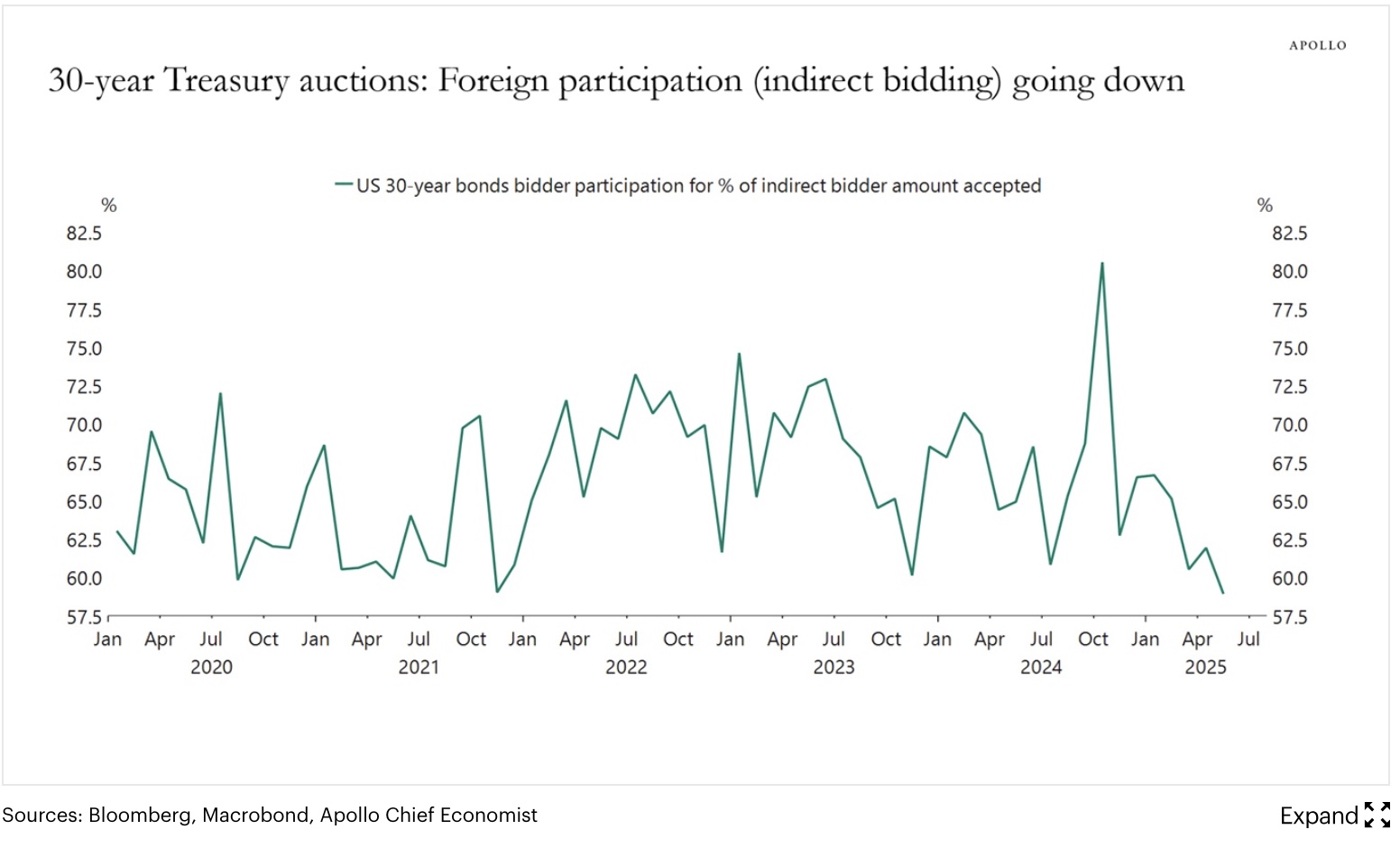Bond yields are rising: Could a sovereign debt problem morph into a share-sinking crisis?
The last fortnight's rise of longer-dated bond yields in the US, UK, Japan and Australia caught the attention of equity investors overnight as a global vote of declining confidence in sovereign debt markets sent Wall Street lower.
So could a global sovereign debt problem, morph into a sovereign debt crisis and send equities into one of their regular tailspins, after one of the most surprising rebounds I've seen in 20 years?
The US 30-year bond yield has now jumped about 20 basis points to 5.08% this week and is just shy of its highest level since 2007 at 5.13%. The moves come as bond traders allow governments to roll over their debt, but at higher rates.
Overnight an auction of US 20-year debt was also weak as investors worry about the potential fiscal impact of President Trump's erratic behaviour and desire for tax cuts in his "Big Beautiful Budget Bill."

"There was another weak bond auction in the US overnight, pushing yields ever higher," said NAB this morning. "There is a risk premium being applied to US bonds, from concerns over tariffs and, perhaps more significantly, rising government debt. The Big Beautiful Bill could add significantly to the government’s debt."
Long-dated free rates are rising and asset markets are making unusual moves
Arguably, the price action in bonds is ringing alarm bells for equity investors who tend to be the most optimistic and last to react to big moves in fiscal scaffolding. Gold has also rocketed a shock 42% over the past 12 months in a highly abnormal move that also conflicts with the rise in risk free rates.
Elsewhere, bitcoin hit a record high overnight and is surging. The price action even threatens to decouple the risk bellwether from its correlation to the Nasdaq 100 Index and morph from a bubble asset to a potential safe-haven in times of crisis. The jury is out on that move, but it's something to watch.
A more important point to note is that it's highly unusual for bond yields and gold to rise in tandem with equities in what's becoming an 'everything bubble'.
These kind of moves suggest one, or the other, of these asset classes, is going to see a dramatic repricing to adjust to shifting capital flows in the global economy.
Relationship between stocks and bond yields
To explain in simple terms rising bond yields expressed as risk free rates mean stock valuations should fall.
This is because stocks are valued on the assessed present value of their future cashflows adjusted for discount rates, which are linked to numerous risks and the time weighted value of money.
This means if money is worth more today and into the near, medium, or long term future then the future cashflows of stocks (usually from dividends) are not so valuable, as they're subject to significant business risk and may never be received.
This means stock investors should demand an (equity risk) premium above risk-free rates to compensate them for this risk.
However, equity valuations have rocketed despite the rising bond yields (especially at the long end) that signal investors are worried about governments' fiscal deficits and debt loads.
The rises also signal that bond investors are worried that central banks in the US and Japan for example may have lowered short-term cash rates too much as price inflation is not on a sustainable downward trajectory.
Japanese 20-year bond yields are now at their highest since the year 2000 at 2.55% as the country's debt load equals about two-and-a-half times its annual GDP at around 263%. This is like earning $100,000 a year but having a credit card debt of $250,000 and Japan's prime minister Shigeru Ishiba recently said its debt problem is worse than Greece's.
How to think about this
If you're an equity investor it's probably worth remembering the old Peter Lynch phrase that more money has been lost in shares by people trying to anticipate corrections than in the actual corrections themselves.
So selling stocks and rushing to cash probably doesn't make sense as you cannot time the market. Especially a market so heavily sponsored by central banks in today's world and one where it's possible sustained growth from AI-linked and other productivity gains lowers bond yields and allows equities to march higher.
Despite this, I am in the equities bear camp. But, I'm not rushing to do much as I'm happy to take a 10-year view and reckon the best stocks will still outperform almost every other asset class over the long term.
It's also worth noting that US Treasurer Scott Bessent is on the record stating that his solution for the US is to grow gross domestic product (GDP) faster than its debt load.
In theory this should reduce the debt to GDP ratio that he's signalled he views as the nation's number one problem.
However, Bessent doesn't have a magic wand and growing GDP faster than debt is easier said than done. It's also likely to involve a loosening of financial conditions, which will include cuts to cash rates, cheaper money and stimulus in the form of tax cuts or money printing if necessary.
The resultant liquidity rush or plan to 'run the economy hot' and erode the value of the debt could also push stocks higher, even if on unstable grounds.
However, after the 'great economic moderation' of around 20 years of steady inflation and growth up to the GFC of 2008, the global economy has lurched from one debt crisis to another in the 16 years since, so it's possible we face another one.
4 topics
.jpg)
.jpg)